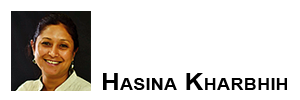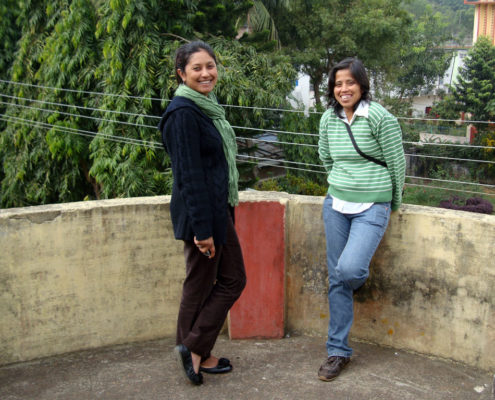My Journey as a Social Entrepreneur
I don’t quite like to call myself a social activist. I believe that to make any permanent and substantial change, it is wiser to approach with diplomacy rather than confrontation.
Starting young
I grew up in Shillong. No, I don’t play the guitar or sing, but I love listening to music. I was in the eighth standard, when I enrolled myself in a school-level leadership programme called Leadership Training Service (LTS). We used to help out in the community during weekends – cleaning up in hospitals and engaging in storytelling with the elderly as well as street children. I loved it. After high school, the LTS weekends stopped. I was lost. I started feeling like a part of me was gone. But I wasn’t ready to give up yet. With a few like-minded friends, I founded a group called Impulse NGO Network to keep the community work going. We started small, met at my home and did a few fundraisers. But soon, we realised that it needed an official structure and form. That is how Impulse NGO Network was born.
We had no money of course. We were students who had recently joined college. I attended 6AM classes to devote more time to Impulse NGO Network. Other than the fundraisers, I started writing in local and national newspapers and magazines, contributing lifestyle, fashion as well as social interest stories to make some extra money. I was ready to work hard to sustain and keep our mission fuelled. That is what I like about starting young. You don’t mind making mistakes. You are always aiming to doing better, overcoming obstacles, exploring, proving yourself that you can do, that you can make that dream a reality.
We gradually expanded our body of work and organised a group of volunteers to develop and implement rural livelihood initiatives in Syntein village, East Khasi Hills District of Meghalaya. We started working with village women artisans to help them apply their traditional skills to develop a sustainable livelihood.
Impulse NGO Network encounters Human Trafficking
But soon after earning their trust and rapport, we learnt that in many villages of Meghalaya, children had gone missing. When we investigated, we learnt that men, promising them jobs as domestic help, had taken these children. They were actually being trafficked to urban areas for forced labour. Nobody in the Northeast had initiated any measure to tackle human trafficking till then. So we decided to take it up through public awareness, capacity-building and case intervention.
While we spread awareness about child trafficking, I also sent a hundred letters to importers around the globe telling them about locally handmade craft designs of rural Meghalaya and asking if they would want to buy. The response was very positive. We were curbing the unsafe migration of the children, by helping rural women generate money through traditional skills. It was the starting point of my major economic livelihood initiative.
Around this time, we also did a mapping exercise to get a statistical picture of the rise in human trafficking. We asked ourselves:
- Why was this migration happening?
- Where was it happening?
- What was their destination point?
- Was there any tracking of the migrant process?
- How safe was it for them?
What we found, was unexpected.
Laws created by the Indian government had stunted economic opportunities in the region.
Environmental protection policies were hindering youth employment in communities dependent on forest resources, leading them to migrate, in search of job opportunities.
Many of these young migrants were trafficked as domestic help and trapped in the cycle of sexual exploitation and duped into going to their destination points. And there was no system to track them.
After much deliberation, we undertook the anti-trafficking initiative, resulting in the Impulse Model (earlier known as Meghalaya Model): an internationally acknowledged, holistic method that encourages and engages public and private stakeholders to work together to combat human trafficking. Approximately, more than 72,442 people, including men, women and children have been rescued, rehabilitated and repatriated by Impulse NGO Network in the last 20 years with the help of this model.
Challenges
Nobody likes being exposed for wrongdoing, especially if they are powerful people. More so, if it’s a woman tearing off the façade! So they counter your efforts with warnings and threats. In my case, physical attacks didn’t get sparse either. I received threatening calls and got assaulted in front of Shillong District Council Court in 2009.
Instead of rattling me, these intimidations emboldened me even more. I went all out enlisting support from sympathetic associations and people, in which the Asian Human Rights Commission played a great part. They not only came forward to offer me protection, they also took my cause to an international forum. The Ashoka Innovator for the Public network also encouraged me a great deal in overcoming these obstacles. I knew I was not alone. The help of these renowned organisations as well as my ever-supportive team gave me courage to strive for what I believe – to create “A World Without Human Trafficking and Exploitation.”
Awards and fellowships
As people worldwide started noticing the changes that Impulse NGO Network was beginning to make, I had the occasion to become both an Ashoka Fellow in 2006 as well as a Fellow of the Aspen India Leadership Initiative in 2010. I was commended for my efforts through many prestigious awards as well.
Impulse NGO Network is today a strong force against human trafficking; rescuing young people from destitution, rehabilitating them and reinstating them into a safe and homely system of livelihood. Impulse Social Enterprises – the network’s for-profit extension – is taking forward local handcrafts into the national and global market, giving the artisans their honest due. That is a reward in itself.
My philosophy
I enjoy what I do and challenges only inspire me to strive harder.
I also believe in the youth. Young minds – efficient and capable, as they are – can reshape society, if shown the right way.
But most importantly, I believe that social entrepreneurship is the understanding that: growth is not measured by the volume of profits, but in the change that it brings to the system or community.



